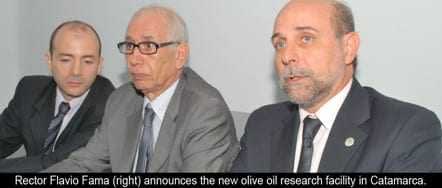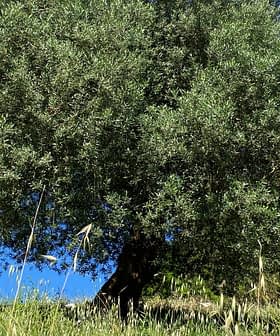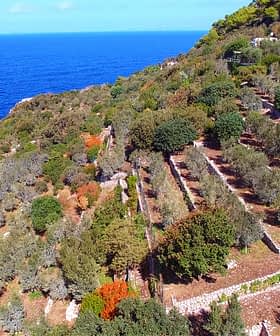
A research facility to improve technological and agriculturual methods of olive oil production was inaugurated in the Argentinian province of Catamarca this week.
The facility is part of a project spearheaded by the National University of Catamarca (UNCA), with funding and direction coming from both the Common Fund for Commodities and the Canadian Berci International group of experts in agricultural development. The program will give a boost to regional farmers, offering them training in the latest methods of production, bottling and marketing techniques. It is hoped that the move will empower small and medium sized producers in the region, particularly those who did not benefit from tax breaks introduced by the Kirchner government in recent months.
These are tough times for olive oil producers in Catamarca who are confronting challenges led by the world drop in prices and stiff competition resulting in an increasing number of layoffs and even a state of emergency within the province’s Pomán department.
The new project is a concerted effort to help local farmers and producers make quality olive oil at more competitive rates. This point was echoed by Catamarca’s Minister of Production and Development Juan José Bellón, who said the initiative will help distinguish Catamarca as a region capable of producing the highest quality olive oil.
He went on to say that the project development was being achieved in the midst of a crisis facing the sector “…even though there are no measures from the national government to reverse the situation.”
The project will apply expertise from institutions including the Common Fund for Commodities, an organization that works closely with International Commodity Bodies (ICBs) to advance commodity sector development in member countries and policy advocacy. Berci International will offer experts in global development projects including agronomists, scientists, agricultural economists, and project managers knowledgeable in creating high quality products and in improving market access.
In a recent talk given at the University of Catamarca, university president and project leader Favio Fama said the project will benefit more than just the farmers:
“First of all small and medium producers, who gain access to training and technical assistance in the field and at the pilot plant with the aim of improving the quality of their products. Second, the UNCA will benefit from the acquisition of technology, experience and knowledge of international researchers. And thirdly, the provincial governments, since there will be a focal point for the production of quality olive oil.”
The opening of the new training and demonstration facility is said to be just the first phase of the project in which the University of Catamarca is reported to have invested $1.5 million.








